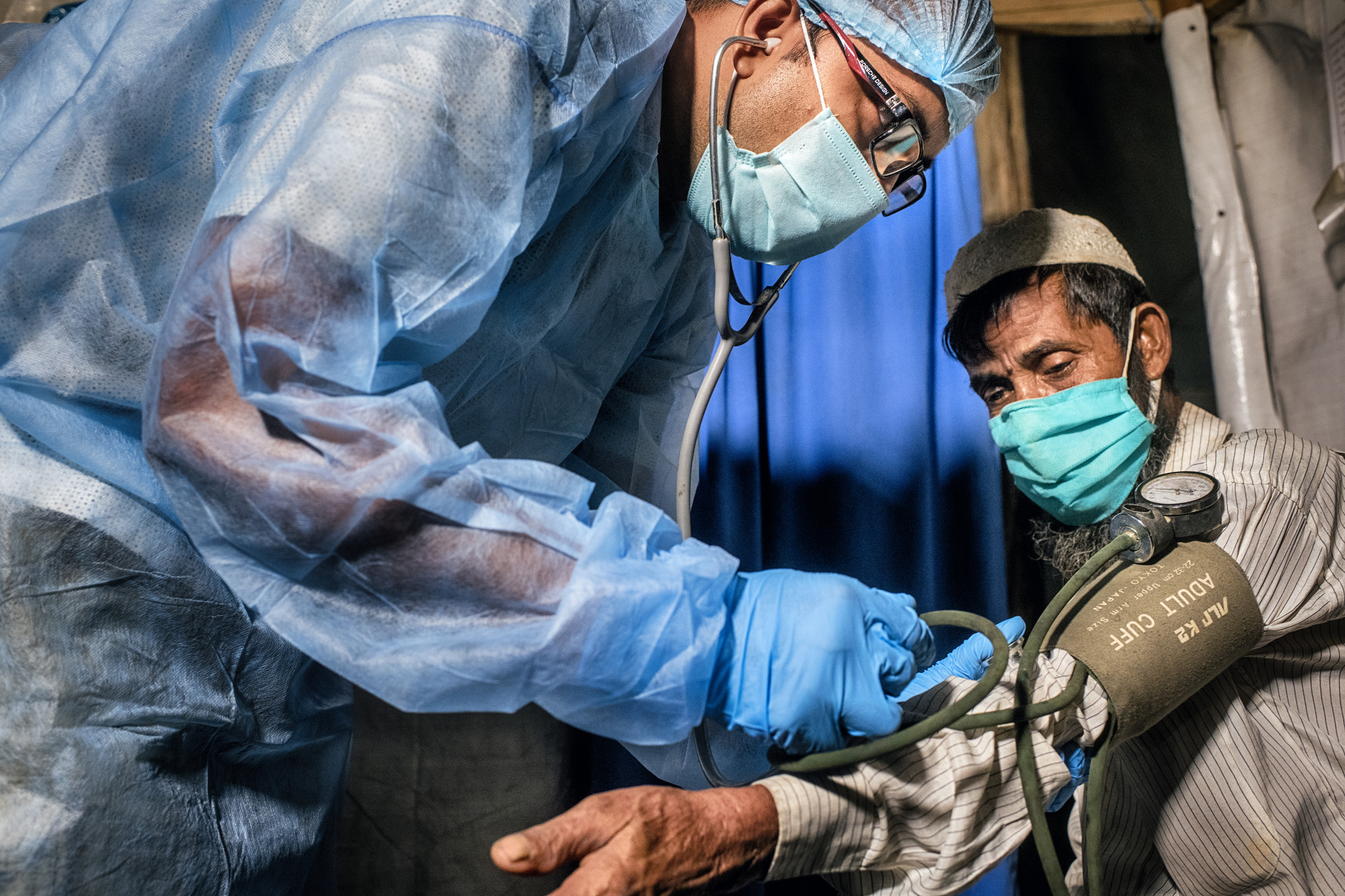 An elderly Rohingya man receives treatment in Cox’s Bazar
An elderly Rohingya man receives treatment in Cox’s Bazar
DEC Coronavirus Appeal raises £10 million to help people in world’s most fragile states as doctors in Syria prepare for ‘an explosion of coronavirus’ in camps for displaced people in ‘critical’ week ahead
The Disasters Emergency Committee (DEC) has raised £10 million since its launch on Tuesday 14 July of its Coronavirus Appeal to help the most vulnerable communities in the world fleeing conflict and instability and now facing the deadly threat of Covid-19.
In Syria, one of the countries being targeted by the appeal, DEC member charities are reporting urgent concerns about the risks of the virus spreading, as vulnerable people are unable to take the basic measures to protect themselves.
Mustafa, 28, a frontline worker supported by DEC member, CAFOD, lives in a camp outside Idlib with displaced people and is preparing for what he calls ‘an explosion of coronavirus’ in the camps.
Mustafa said:
“My heart is beating so hard; we are expecting an explosion of coronavirus in the camps. The coming days are really critical for us. Doctors are preparing for the spread of the virus. People live in large overcrowded settlements in tents with maybe 12 people and no access to clean water. It will be a catastrophe. Disaster. Please help them.”
Of the 111 public hospitals in Syria, only 57 public hospitals (64%) are fully functioning. There is a considerable shortage of trained staff and a high turnover rate, reducing capacity to manage cases. Up to 70% of health workers have already left the country.
In North West of Syria, Idlib and Aleppo governorates, a recent report by Help Age International, affiliated with DEC member Age International, showed that out of the almost 800 people aged over 50 who were surveyed, 14% were not aware of Covid-19 and close to 50% reported not being able to access PPE or hygiene materials because they were too expensive or not available in the market. Of the 277 interviewed who were living in camps, many in tents with several people, 42% faced challenges getting access to clean water and sanitation.
Anne-Laure Hallaire, Regional Humanitarian Programme Manager at Age International, said:
“From our findings, the level of people’s awareness of Covid-19 was extremely low. The situation in North West Syria is rapidly deteriorating, and with the deflation of the Syrian pound, basic items such as food and medicine are the priority for people, whereas soap and hygiene items are not.
“With Covid-19 cases being reported and preventative measures not being followed by people, especially in overcrowded camps, where social distancing is difficult, awareness-raising is critical. This is an extremely worrying and anxious time for everyone.”
Walid who lives in a camp in Aleppo governorate said:
“My family and the people of the camp have fears of an outbreak of Covid-19, especially as the majority of neighbouring countries have suffered from the same disease. I do not feel that we have the ability to take full precautions, because many families live in the same tent, the water isn’t often clean and we do not have enough hygiene or sterilisation materials for the whole camp. So, I have serious concerns that the virus will spread in the crowded camps. God forbid.”
Saleh Saeed, DEC Chief Executive, said:
“With warnings that the virus could spread like wildfire in camps in Syria and elsewhere, our appeal to help the most vulnerable people is now urgent.”
“We are witnessing the tremendous generosity of the UK public who, even in the midst of their own uncertainty during this pandemic, have reached out to help the poorest and most vulnerable threatened by Covid-19 in countries weakened by years of war and instability. The UK public have been incredible with their support, but we urgently need more funds to scale up operations and save lives as the virus continues to spread.”
The DEC Coronavirus Appeal will help the most vulnerable people in six of the world’s most fragile states: Yemen and Syria; Somalia, South Sudan and the Democratic Republic of Congo; and Afghanistan. A total of 24 million displaced people live in crowded temporary shelter in these countries.
The appeal also includes the world’s largest refugee camp – in Cox’s Bazar, Bangladesh, where more than 850,000 Rohingya refugees have sought sanctuary.
Despite the many challenges presented by the pandemic, the 14 DEC member charities are already present and working in refugee and displacement camps. They urgently need more funds to scale up their operations and save lives.
The Disaster Emergency Committee (DEC), is made up of fourteen charities, including Tearfund, Christian Aid, Concern, and Red Cross which will all be fundraising in Northern Ireland.
Rohingya-Camp.jpg


